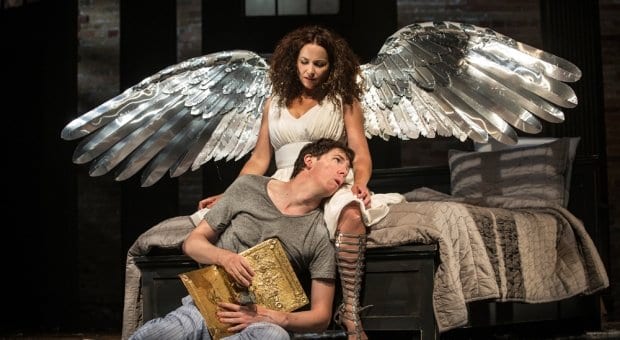I saw Angels in America my first month in theatre school in Toronto. Fresh-faced from the suburbs, I’d arrived at York University knowing what little I did about the art form from drama class. I had vague aspirations of changing the world through art. In reality, I was more excited about buying cigarettes by the carton and leaving them in plain view or taking the subway to the Village rather than borrowing my parents’ car and trying to get it home before morning so they didn’t know I’d missed curfew.
I think it was our second week of school when it was announced they’d scored us tickets. I remember audible gasps from the more knowledgeable of my classmates, thrilled we’d get to see the Toronto production of the Tony Award-winning epic. I had no idea what the play was about. I’d never even heard of it. At 17, I’d never seen a play that wasn’t an Andrew Lloyd Webber musical or a high-school-drama-festival production. I didn’t know it was possible to feature gay characters or nudity onstage. My big ambition was to work at the Stratford Festival.
More than that, I didn’t know theatre could be about so much. I thought its primary function was to entertain. My drama-club friends would roll their eyes at “issue plays,” the standard after-school-special fare talking about drugs or sex, which invariably came to the conclusion “Don’t do it.” But Angels had everything. Beyond the discussions of Reagan-era politics (which largely went over my head at the time), religion and race, it featured gay relationships, a coming-out story and two men dying of AIDS.
The play left me with an endless series of questions about what kind of gay man I wanted to be, what kind of artist I wanted to be and what kind of life I wanted to live, questions I’m still working on today. It became the Sisyphean touchstone of my creative practice, a piece I was simultaneously trying to live up to and aware I would never reach.
Seeing the new Toronto production in preview this week, I realized I’d forgotten the work’s final (and perhaps most important) line. Speaking directly to the audience about the future of humanity and the journey we’re on together, Prior says, “The great work begins.” It made me cry this week, just like it did in 1996, but for totally different reasons.
The 1990s were a hopeful time. We really believed we could make things better. Yet despite improved treatments for HIV and tiny victories for gay rights in small corners of the world, access to those treatments is limited to a privileged few, and the queer community faces increasing violence and oppression in many places. Poverty, inequality and environmental destruction are worse than ever.
Tony Kushner made me believe I could change the world through art. But seeing the play that so affected me 17 years ago, I’m left wondering if the prospect is like dusting with a dry cloth: not really cleaning but just moving the dirt around. Back then, Angels felt like a call for optimism. Now it feels like a testament to how badly we’ve fucked things up.
Angels in America
Runs until Sat, Sept 14
Parts I & II run separately and together (special pricing available for combined shows)
Young Centre for the Performing Arts
50 Tank House Lane
soulpepper.ca
Read a story on the new production and its star, Damien Atkins.


 Why you can trust Xtra
Why you can trust Xtra


